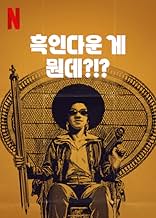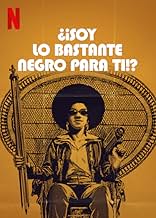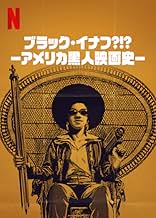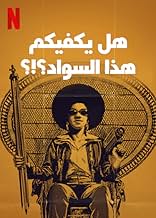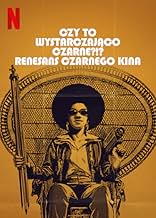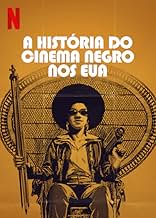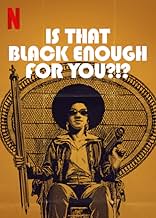L'historien et critique culturel Elvis Mitchell retrace l'évolution (et la révolution) du cinéma noir, de ses origines aux films percutants des années 70.L'historien et critique culturel Elvis Mitchell retrace l'évolution (et la révolution) du cinéma noir, de ses origines aux films percutants des années 70.L'historien et critique culturel Elvis Mitchell retrace l'évolution (et la révolution) du cinéma noir, de ses origines aux films percutants des années 70.
- Prix
- 4 nominations au total
- Narrator
- (voice)
- Self
- (as Louise Archambault Greaves)
- Self
- (as Jim Signorelli)
Avis en vedette
The documentary mainly focuses on Blaxploitation movies of the 1970s, basically 1968-76, the introductory bit deals with movies before that time. Killer of Sheep and Symbiopsychotaxiplasm get special non-Blaxploitation mentions. I'm not sure I heard Blaxploitation discussed from an afro-american perspective before, certainly not to this extend. Like most people of my generation I learned of these films first from Tarantino. Who as Mitchell points out here got his start by putting dialogues common in black films into the mouth of his white actors. Which, as much as you might dislike that take, is true. And yes you want so say: But, Samuel L. Jackson... and I tell you: he is not in Reservoir Dogs. Now, is he? He is in this documentary though.
Mitchell make quite a number of other interesting point throughout, highlights some of the forgotten pioneers and gives you a good overview of the film of that time. Unless you are easily offended by black view points and you are interested in movies, this is way worth your time. Does it at times makes points I disagree with. Sure, but I am an adult, I don't need people to agree with me 100% to find it interesting what they have to say. And yes sure it could have talked about more or other movies, but it already crammed a lot into it's run time.
Ps. I read in another review here that is very telling that Sidney Poitier wasn't interviewed for this. No, it isn't. Poitier already quite sick by that time, do your f--ing research. Do you really think Poitier was not aware of the things Mitchell says about his career? I'm a white European and I was aware of them beforehand. Also, if you want to know why Roots isn't discussed, because this is about movies not TV.
Lady Sings The Blues- I was young when my mom took me to see this in the theater. I was 8, but I was told this was an important movie of an historical figure that needed to be implanted into my young mind. I honestly don't recall the makeup of the audience but I do remember the seats being packed, and being angry at the end. My mother explained to me how important Billie was to music today, and how awful humanity can be to one another.
That's a pretty heavy message to lay on an 8-year olds head, but the message was not lost on me. My point is, not every white person was avoiding important black films and during the 70s, racism was being addressed and a lot of white people were horrified. Growing up in and around Madison, WI, there were quite a few black children in my class, and it honestly never occurred to me that they were anything other than classmates, and some were my friends.
As I grew, things like Roots, Blazing Saddles, Mahogany, Car Wash and stealing listens to my dad's Pryor and Red Foxx albums dot my youth and it wasn't ever presented as anything other than entertainment- my parents weren't 'white knighting' for black culture,!there was just pop culture and skin color had nothing to do with it.
Now, make no mistake, I'm certainly not saying there was no racism, no ignorance, stupidity, but not everyone was a racist hilljack from Alabama- it just didn't occur to us to judge anyone by anything other than their character and fortitude.
I find it a little odd that there's not a single reference to Roots- how does one discuss black film and dismiss out of hand this important contribution? I remember being a teen and seeing Richard Pryor and Gene Wilder in a few buddy movies, along with Gregory Hines and Billy Crystal- there was significant overlap in racial viewing, and bands mentioned like EWF, along with other funk bands like Commodores, Sly and the Family Stone, Rick James, etc that had soaring success with as many white fans as black.
It's ironic that Poitier declined to be interviewed for this, and speaks volumes when the producers list includes conspicuously white names like Steven Soderbergh and David Fincher. I'm not sure what purpose is served by this doc, and what the intended consequences are- there's no amount of revisiting the issues that will change the outcomes, and the outcomes intended here aren't necessarily that of truthfulness, either. Billy Dee Williams had a significant impact on the genre of film, as did Sidney Poitier, Denzel Washington, Morgan Freeman, the list goes on and on.
Basically, the issue here is that the film maker has decided that he wants to cover a LOT of Black films, which forces him to deal with some of them very quickly. One of the seven previous viewers attributes this to a desire on Mitchell's part to show off how many Black films he has seen, but that was not my impression. Rather, it's clear that he is fascinated with a lot of these movies, and intent on sharing his fascination and knowledge with us. That's hard to do in a movie, though, unlike in a book. Mitchell might have thought about doing what Ken Burns has done with some of his documentaries: focus on the most telling things in the movies themselves, and then provide the rest of the information in an accompanying picture book.
Books are good for annotated lists. Movies, not so much.
On the hand, because Mitchell sometimes seems like he is trying to be encyclopedic, some of the seven previous reviewers have criticized him for leaving out X or Y Black film or star. A few have a point, but others didn't pay attention. One complained that Mitchell left out James Brown, for example, which is not true. There is a very striking scene of Brown standing shirtless in a doorway, in all the glory of his virile, muscular, and very angry masculinity. It would have been nice to learn if he was offered roles other than those, but that would have taken more time than Mitchell had in this movie.
The same is true of some of the other previous criticism. Those viewers just didn't watch closely enough.
My take on this is that it was interesting for what it offered, but that it often left me wishing for more than just a tidbit on a given interesting movie. So, I guess, I would have preferred less encyclopedic coverage and more in-depth analysis of fewer movies.
On the other hand, I don't regret having seen any of what I saw.
Mitchell clearly knows this material. He should definitely treat us to an accompanying illustrated book, where he is not limited by time.
One of the more unexpected aspects is it's inclusion of experimental films, from animation to split screen. There is minimal focus on this but it does highlight ambitious storytelling and filmmakers responses to a restrictive system.
The documentary delves deep enough to uncover marginalized black films intended for black audiences that have gone unnoticed by the media and the general public.
The movie's editing becomes unsteady when it jumps back and forth in time, with testimonials that elongate the script. The script also places a heavy emphasis on black films prior to 2000, leaving the film feeling incomplete or as if it is anticipating a sequel.
Le saviez-vous
- GaffesWhile discussing À l'ombre de Shawshank (1994), the narrator identifies Rita Hayworth as white. Hayworth's real name was Margarita Carmen Cansino, and she was of Romani descent (an Indo-Aryan ethnic group, also known by the term "Gypsies"). She had her name changed, and appearance slightly altered, to aid her career. Prior to that, as Rita Cansino, she had been limited to smaller exotic roles.
On a related note, towards the end of The Shawshank Redemption, Andy has replaced the poster of Rita Hayworth with a poster of Raquel Welch. Welch was born Jo Raquel Tejada, but went by "Raquel Welch" for the sake of her career (to avoid getting trapped into roles available to Latinas). She did not acknowledge her true heritage until she worked on American Family (2002).
- Citations
Harry Belafonte: Not one picture that I turned down did I regret not doing. I didn't resent any of them. I'm glad others got an opportunity and went off and did it, but my initial... First and foremost, I'm an artist. I'm an actor. And I came out of a school with Marlon Brando, Walter Matthau, Rod Steiger, Tony Curtis, with a director that gave us no quarter. I'm not gonna do anything other than what I think is worthy of being done. And fortunately for me, I was a runaway success in the world at large because I had a globe so passionately approving of my presence in their midst that nobody could dismiss the fact that that thing on the horizon called Belafonte could really not be fucked with. Because anytime anybody came up and gave me an ultimatum, I said, "Fuck you. I'm going to Paris. I'll probably live there if I like, but I... I have a destination that answers your denial of what I could be."
- ConnexionsFeatures A Fool and His Money (1912)
Meilleurs choix
- How long is Is That Black Enough for You?!??Propulsé par Alexa
Détails
- Date de sortie
- Pays d’origine
- Site officiel
- Langue
- Aussi connu sous le nom de
- Is That Black Enough for You?!?
- sociétés de production
- Consultez plus de crédits d'entreprise sur IMDbPro
- Durée2 heures 15 minutes
- Couleur
- Mixage


